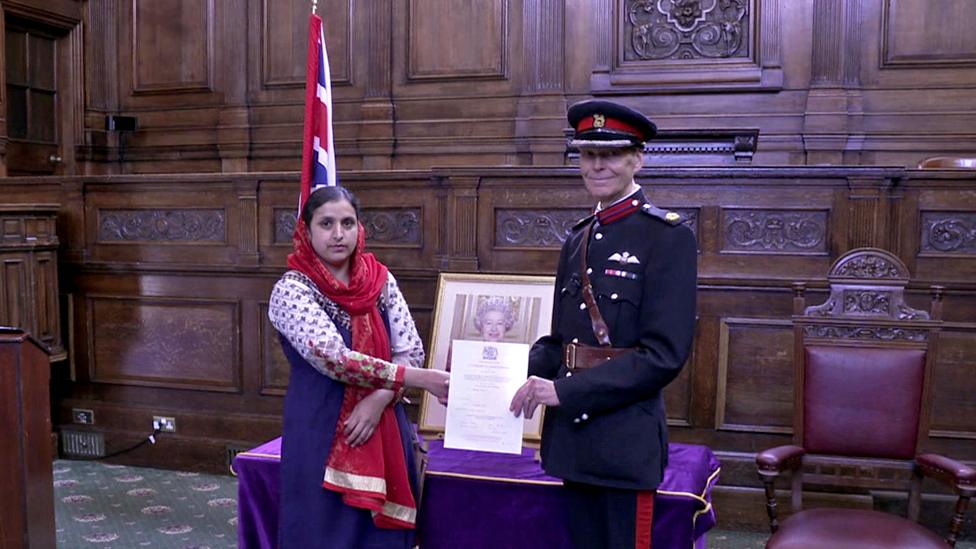Citizenship test: How hard should it be to become British?
- Published
We invited a mixture of UK born, and newly made citizens to Wakefield Town Hall for a test of all things British.
The Home Office is reviewing the process foreign nationals undergo if they want to become UK citizens.
There is likely to be intense public debate over any changes which could include overhauling the "Life in the UK" test where applicants demonstrate their knowledge of UK laws and history.
A cash cow?
Becoming British is one of the most arduous and expensive citizenship processes in the world.
Many of the tens of thousands of people who are accepted as UK citizens each year will have faced years of preparation and bills of between £5,000 and £10,000.
As if to add insult to injury, the Home Office then charges them a final £5 for The Oath, an integral part of the ceremony in which applicants swear "allegiance to Her Majesty Queen Elizabeth the Second, her heirs and successors according to law".
It's not surprising some people believe the government treats citizenship as a cash cow.
Registering a child as British will set you back £1,012, even though the actual administrative cost is barely a third of that.
This fee alone is calculated to have generated more than £100m in profit for the Home Office in the last five years.
Most adults hoping to become citizens must already have indefinite leave to remain in the UK, a process that involves migrants paying £2,389 for an exercise that costs the government just £243.
It might be argued this represents good business for the Home Office, but it depends on what the country wants to achieve.
Do we want foreign residents to become British or not?
And if we think citizenship is good for integration and cohesion, are we right to make it so expensive and complicated?

Becoming a citizen means passing the Life in the UK test, a general knowledge quiz on British culture, laws and history.
But I reckon most native Brits would struggle with questions on the powers of devolved governments, Welsh artist John Petts and the rebellion of the clans.
Is this a sensible preparation for British life or a strange initiation ritual?
The meaning of 'British'
The Home Office is currently reviewing the format of the test, but it might also be useful to consider the broader aim of citizenship policy - particularly for a post-Brexit Britain.
The think tank British Future is due to hold an independent inquiry into UK citizenship, external, chaired by Conservative MP Alberto Costa, intending to produce a series of recommendations on how the process might be improved.
Before you can begin with such a question, you need to reflect on what being British means.
The government suggests it is about respecting the laws, values and traditions of the UK and provides a helpful list of "values and responsibilities".
Along with obeying the law you are expected to "work to provide for yourself and your family", "vote in local and national government elections" and "help others".
The official guidance suggests you introduce yourself to your neighbours, keep your garden tidy and only put your refuse bags and dustbins out if they are due to be collected.
In 2009, the Labour government published a Green Paper on the rights and responsibilities of citizens, putting the case for change.
"In this more atomised society, people appear more inclined to think of themselves and one another as customers rather than citizens," it suggested.
"Individual rights must be promoted and protected without losing sight of the essential contribution of responsibilities to collective harmony and prosperity."
Civic duty
The Italian Constitution says "every citizen has the duty to undertake an activity or function that will contribute to the material and moral progress of society".

While voting is not compulsory, Italian citizens are also reminded that "the exercise thereof is a civic duty".
US Citizenship and Immigration Services lists the responsibilities of an American citizen, including a requirement to "stay informed of the issues affecting your community".
The State Department used to say this meant reading a newspaper every day, a responsibility that many journalists will have been sad to see amended!
The US also says citizens should "pay income and other taxes, honestly, and on time" as well as being ready to "defend the country if the need should arise".
A decade ago, the then UK Home Secretary Jacqui Smith wrote about "a deal for citizenship".
In return for enjoying the liberty, tolerance, opportunity and diversity of the UK, she said there was an expectation that "all who live here should learn our language, play by the rules, obey the law and contribute to the community".
Her proposals included the idea of "probationary citizenship", a period during which a migrant could speed up the journey to becoming British by demonstrating that they had played an active part in their community.
These ideas were abandoned when the coalition came to power in 2010, but there is something attractive about linking citizenship and civic responsibility, reminding the whole population that there is more to being British than obeying the law.
The country expects that everyone who is able should put their bins out on the right day, sweep their front step, take an interest in local affairs and volunteer in the community.
That strikes me as more valuable than a "pub quiz" on the repeal of the Corn Laws and the correct ingredients of an Ulster fry.
